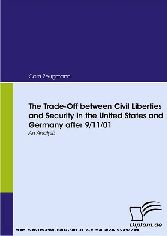Suchen und Finden
Mehr zum Inhalt

The Trade-Off between Civil Liberties and Security in the United States and Germany after 9/11/01. An Analysis
Chapter 4.1, The Declaration of the War on Terrorism and its Implications:The smoke and debris over New York had not lifted yet when President Bush declared that America had not only been under attack, but that the events that had taken place on 9/11 were the beginning of a war on terrorism, a war that might take long, a war that would not only affect the American people, but the entire globe. Like years before, when the U.S had declared the war on drugs, the declaration on the war on terrorism commenced a new era of a realignment of domestic politics and the legislative landscape. Led by the view that there is nothing like strengthened security, the Bush administration initiated a multilevel response, using rhetorical words like war” as a means to enhance the willingness of the people to accept the cost and potential horrors of warfare. The war-metaphor clearly helped the government to accumulate power it could have never compiled in peacetime. As a result, former democratic priorities like safeguarding the integrity of the U.S. Constitution came second to securing the state from further terrorist attacks. In the aftermath of 9/11, the U.S. has often been criticized for exploiting the paradigm of war and concerns for national security as a scant justification for setting aside foundational principles in favor of capitulating to unfounded fears and pretty prejudices (or to breach civil rights protections for the public and […] [gather] extraordinary power […] in the hands of one man, the president. The fact is that laws that undermine the stability of the checks and balances system and violate constitutional principles, like the PATRIOT Act, have been hastily pushed through the legislative process without leaving adequate time for an appropriate debate. Such swiftness implied that the security of the Union depended on rapid legislation. Additionally, there has been an unprecedented increase of Executive power immediately after 9/11 accompanied by an enhancement of governmental secrecy that is unchecked by either the judiciary or Congress. Furthermore, especially aliens have had to suffer from excessive measures like being imprisoned for months without trial on a mere suspicion of terrorist ties or as material witnesses. In Germany, 9/11 had consequences as if the attacks had happened there. As a result of the tragedy in the U.S., extensive new security legislation was put through. Reasoning that the terrorists’ strikes had been attacks not only on the U.S. but all of civilization, the German government derived an urgent need to adapt the legislation to the new circumstances. The rationale for making new legislation indispensable was not the outbreak of aggression on 9/11, but the diffuse threat of a global terrorist network of Islamic extremists. The event reinforced opinions that the then present legal landscape was suffering from immense deficits. Moreover, when it was discovered that some of the terrorist linked to the attacks had resided in Germany, the already existing debate for enhanced security intensified. The German antiterrorism strategy predominantly sees the individual as a security risk and focuses primarily on foreigners by creating the Islamist foreigner as the new enemy. Kunz claims that this attitude in not new, but that 9/11 has merely boosted this neo-racist attitude. Following this logic, it is not surprising that there was no assessment of the existing legislation before amending it and passing the Antiterrorism Laws I and II only months after the attacks. The pre-9/11 existing agenda to tip the scale in favor for more security was enforced by using the fear to host a potential terrorist foreigner and the widespread threat of becoming the next country that might be targeted. For both the U.S. and Germany 9/11 had severe repercussions. Though Germany interpreted the assaults as terrorist attacks and did not declare a war on terrorism like the U.S., it can be said that there was a severe impact on both country’s legal landscape. In the U.S. as well as Germany security advocates had been trying to tighten legislation for years but were always met with resistance by civil libertarians. This changed in the aftermath of 9/11 when a majority of both populations desired government action to secure the respective countries from further attacks. In the U.S. and Germany, legislation was introduced hastily and in both countries the criminal foreigner was the main target of the security measures taken. The U.S. however, as is evident by the immensely further reaching American legislation, widened its range of legal possibilities much more than Germany and based these changes on the declared war on terrorism. Nonetheless, for both states it can be said that the attacks on the U.S. did not reverse legal processes, but that the terrorists merely enhanced the trends that had been visible before.
Alle Preise verstehen sich inklusive der gesetzlichen MwSt.








